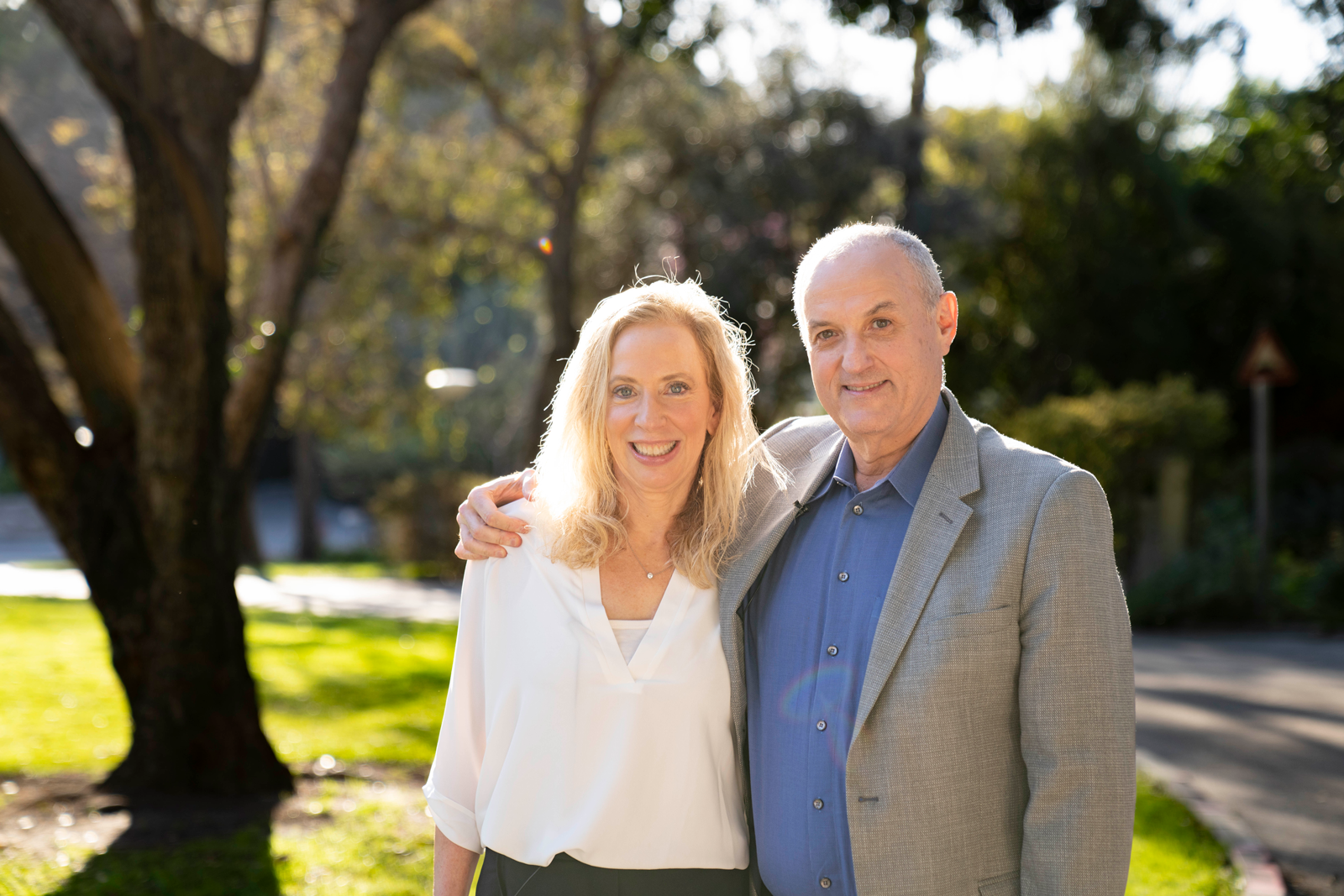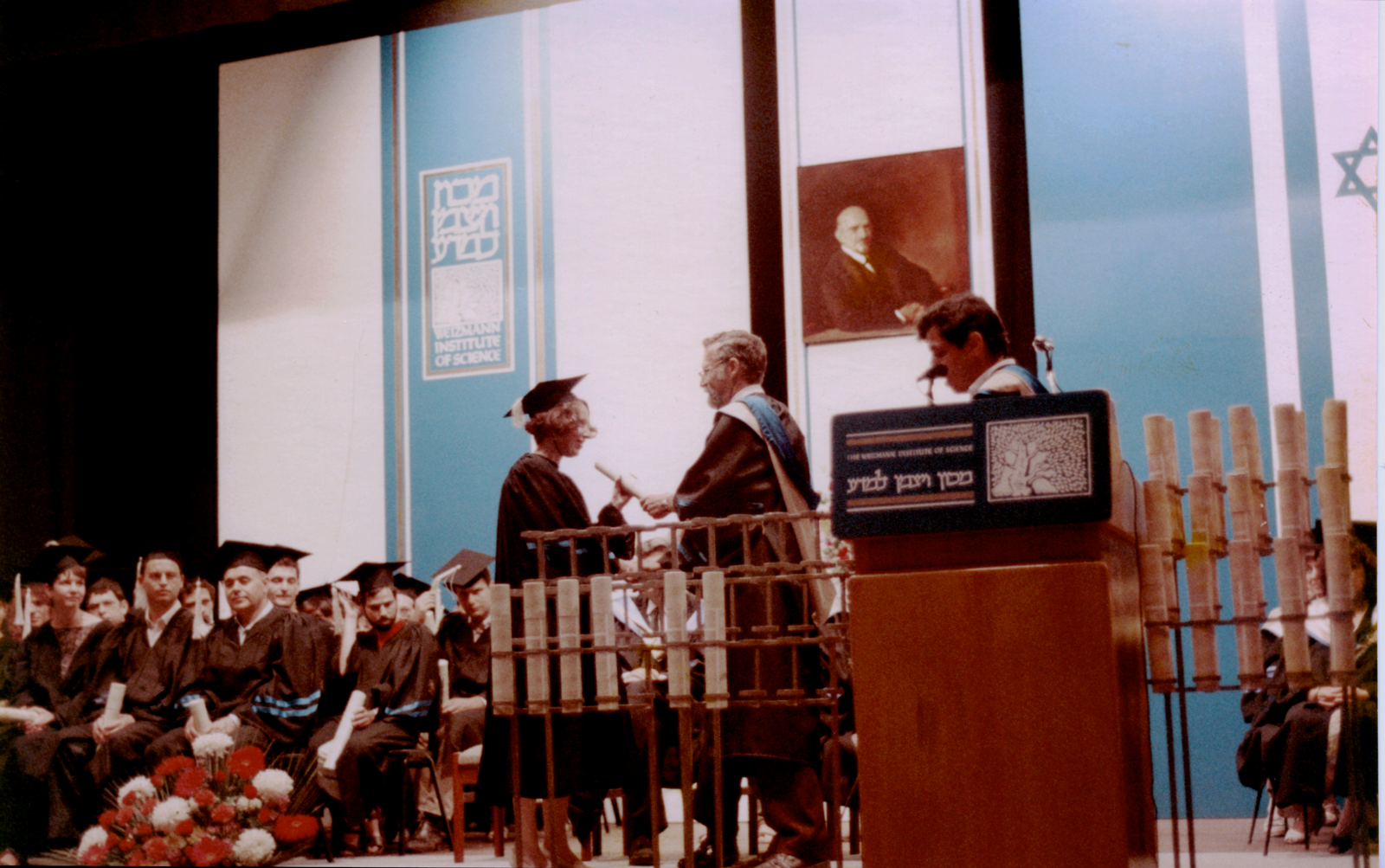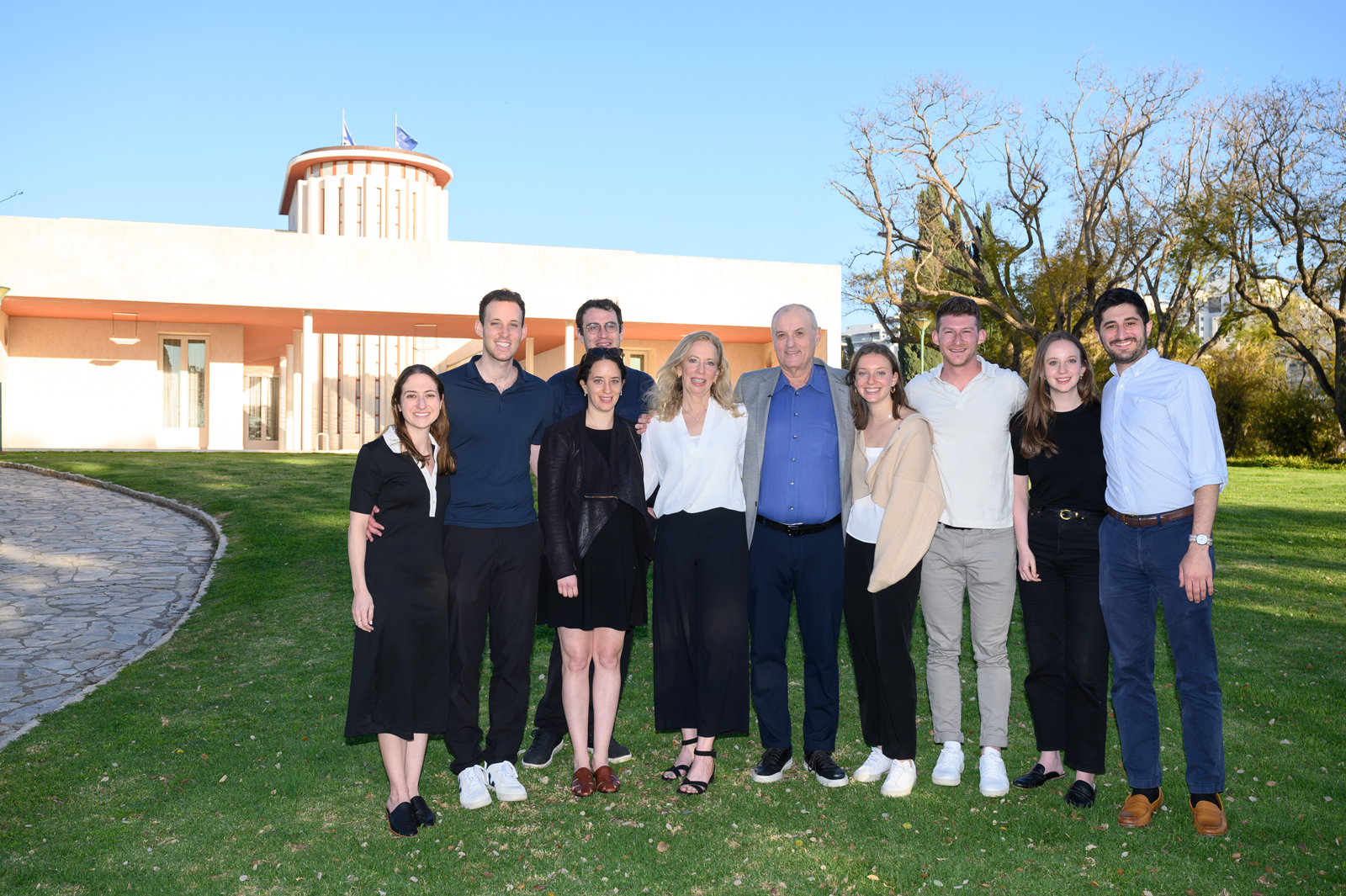Watch Orna and Shmuel Kliger return to the Weizmann Institute of Science and reflect on how special their time there was and the profound impact it’s had on their lives.
For Orna and Shmuel Kliger, a set of advanced degrees in computer science from Weizmann has added up to a whole greater than the sum of its parts: two degrees were the starting point of a marriage, four kids, and major career success in the high-tech industry.
In the late 1980s, computer programming languages were evolving rapidly, and artificial intelligence was still a distant dream. Orna Meyers, an American college student from New Jersey who was imagining and predicting the advent of AI well before its time, and Shmuel Kliger, a math whiz kid from the Tel Aviv suburb of Petah Tikvah who was already considering the possibilities of computers, came to the field driven by their individual interests.
It was the summer of 1985, following her graduation from Brandeis University, when Orna came to Israel to work in the lab of Prof. Ehud (Udi) Shapiro in computer programming. Shmuel, who was just starting his master’s degree in computer science, noticed Orna for the first time at a campus cafeteria during lunchtime. “She was interrogating — nicely, politely interrogating — all the people around the table about their areas of interest and their backgrounds,” he recalls. “Even though she was probably the youngest person there, she wasn’t shy.” Later, when he realized he could use a native English speaker to review his master’s thesis, he turned to Orna and she agreed to help.

Fast forward to 2023, and the couple traveled from their home in New York to Israel with their four adult children and their significant others to celebrate their 35th wedding anniversary — and make a visit to “the place where it all began — the Weizmann Institute,” says Shmuel.
“The success story of the Weizmann Institute is not only about the research discoveries from our labs,” says Weizmann President Prof. Alon Chen. “It is also about the alumni who made this place their home as students, and who have made incredibly impressive strides in industry. Orna and Shmuel not only have a wonderful personal history at Weizmann, but they have made an important impact in the world of technology and the workplace.”

New languages
At Brandeis, Orna learned Prolog, a computer language which Prof. Shapiro was one of the first to employ in the United States, during his doctoral studies at Yale University. He was further developing it at Weizmann, and he was seeking summer students.
Among Orna’s family were strong Zionists; her American great grandparents made aliyah following the Great Depression and stayed long enough for their 18 year-old daughter (Orna’s beloved grandmother) to marry and give birth to Orna’s father. Orna’s mother was a baby when her family left Poland in 1934 and emigrated to Israel. Eventually, her parents met at a Zionist summer camp. So, it was a natural choice for her to come to Israel, and to the Weizmann Institute, for the summer.
“I found it such an amazing place that it was pretty clear to me when I left that I wanted to come back here,” she recalls. After working in Boston in computer networking at the research and development company BBN (later Raytheon BBN), Orna returned to Weizmann to pursue a master’s degree. She studied AI, and received her MSc in 1989.

“I felt lucky to be exposed to some of the ‘greats’ in the field, at Weizmann — Udi, and Amir Pnueli, Shimon Ullman, Adi Shamir,” she says. Prof. Pnueli, who died in 2009, was a Turing Award winner; Prof. Shamir, a co-inventor of the RSA algorithm, the public-key cryptosystem behind secure data transmission, also is a Turing Award winner. Prof. Ullman is a renowned expert on human and machine vision processing. Prof. Shapiro’s Concurrent Prolog became the core technology of his start-up company, Ubique, and he went on to develop a precursor to today’s instant-messaging systems. (Ubique was later sold to America Online). Following her graduation from Weizmann, Orna went to work for Orbotech, the company that Prof. Ullman started.
Shmuel admits he nudged their romance forward by taking advantage of Orna’s then-naiveté about Israeli geography and repeatedly volunteering to drop her off at her relatives in Tel Aviv “on the way back” to his home in Petah Tikvah. At some point she caught on — but kept taking him up on it. Their connection was built during these drives and in the halls of the Ziskind Building, home to the Department of Computer Science and Applied Mathematics. “It was wonderful to work with Orna and Shmuel — they were both great students and very pleasant people, but, in retrospect, I must admit I was quite blind to the romance developing under my nose,” says Prof. Shapiro.

Orna was eager to explore the nascent field of AI, and traveled to Jerusalem once a week for AI coursework at Hebrew University. “AI fascinated me, but it wasn’t able to take off because of the limitations of computing power at the time,” says Orna.
As for Shmuel, both his parents were engineers. “When I was three years old, my father determined that I should be a mathematician — I didn’t really have a choice,” he recalls. “Luckily, it turned out that I actually liked math and was good at it! My father would probably have preferred that I become an academic; he was a purist. But thanks to him, I got into math at an early age, and after my PhD at Weizmann, I have spent my career applying my math skills in industry.”
During high school, he attended a math enrichment program at the Weizmann Institute, thought by Prof. Joseph Gillis, one of the founders of the Department of Mathematics, then went on to receive an undergraduate degree at Bar-Ilan University. He was drafted to MAMRAM, the Israel Defense Forces’ central computing unit, and when determining where he wanted to pursue an advanced degree Weizmann was a natural choice, given his high school experience. He received his BS from Bar-Ilan University and went on to attain a master’s and a PhD at Weizmann, also in Prof. Shapiro’s lab.
Reflecting on his doctorate, which he attainted in 1992, Shmuel says, “Ironically, even though it’s the highest degree you can get, a PhD makes you very humble; you realize that as much as you know, there’s so much that you don’t know. Plus, at Weizmann, you are surrounded by people who are smarter than you. On the one hand, that is very intimidating, and at the same time very invigorating.”

Orna and Shmuel married in Israel, where their first two kids were born, and left for the U.S. for Shmuel to pursue a postdoctoral fellowship at IBM in New York. “I was happy to introduce Shmuel to my friend and colleague Dr. Shaula Alexander-Yemini at IBM,” says Prof. Shapiro. “Little did I know that this will be the beginning of another very long-term and beneficial partnership.”
Turbo-charged careers
Shmuel went on to a career in IT management software, and all the while focused on the most efficient way to automatically allocate resources and fix problems that inevitably arise in complex systems. “Twenty years ago, it was becoming increasingly clear that companies were becoming dependent on inter-related complex dynamic software systems, and efficient resource allocation and automated remediation would be critical.”
Following his postdoc, Shmuel joined his former manager at IBM — Dr. Alexander-Yemini and her husband Prof. Yechiam Yemini who was a computer science professor at Columbia University — in launching a venture called SMARTS (an acronym for System Management Arts). SMARTS was contracted by the communication company Motorola Iridium, which established satellite phone communications networks around the world. Shmuel helped develop the software at the heart of the control center whose job was to analyze the data received from the satellites and ensure their proper operation. He served as Chief Technology Officer at SMARTS, which was acquired by EMC in 2005.
After several years at EMC, Shmuel came up with a concept that would become the basis of a new company that he founded, named Turbonomic. “The timing was really crazy; it was 2008 and the middle of the financial crisis, but I went out and tried to raise money,” recalls Shmuel. “Somehow, I convinced investors, and we got it off the ground.”
Turbonomic’s software automatically analyzes complex cloud and virtualized environments by applying the economic principles of supply and demand to the allocation of resources to make sure applications are performing. That means when things change, rather than using a team of human engineers to figure out what needs to be done, the Turbonomic system uses sophisticated algorithms to determine the proper actions to maintain the environment in a good state where applications are performing effectively.
Orna worked for several telecommunications companies, including MCI and Prodigy, and eventually joined SMARTS to launch its technical training division, teaching its customers how to enhance the product using the Smarts SDK and proprietary programming languages. Orna later joined Turbonomic as Vice President of Global Technical Education, focusing on training customers and partners on how to use the Turbonomic platform. In 2021, Turbonomic was acquired by IBM.
She recently retired from IBM, and is looking forward to their new life in Manhattan, where they recently moved after raising their kids in Westchester. She plans to engage in new pursuits and spend more time with their adult children, Gili, Zachey, Danielle and Maya, and future grandchildren. Ever the entrepreneur, Shmuel has founded a new start-up called Causely, which applies causal AI to manage applications running in the cloud.
“Orna, Shmuel, my wife Revital Hachamoff, and I reconnected again during my sabbatical at Columbia a year ago, and also had our children meet and get to know each other,” says Prof. Shapiro. “Freed from the strings of mentor-student relations, we simply became best friends, and I am sure will remain so.”
Reflecting back on her career, Orna says, “Weizmann taught me how to think in a certain way — to think big — and to question things. I was encouraged to just follow what I was interested in, and go for it. Now, looking back, I realize I carried that core philosophy with me throughout my entire career. In fact, Weizmann was the basis of everything I’ve done in my professional life. And of course, in meeting Shmuel here, the starting point of my family life. Being back here brought back so many wonderful memories and I’m so happy that we could share them with our children and their partners.”
Shmuel, of course, agrees. He adds, “My entire career trajectory was established at Weizmann, and I was awed by science and math. I’ve carried that with me my whole life.”

